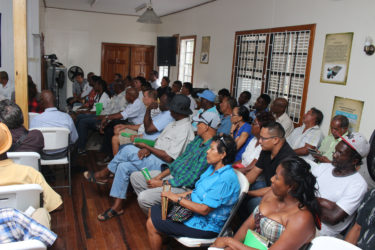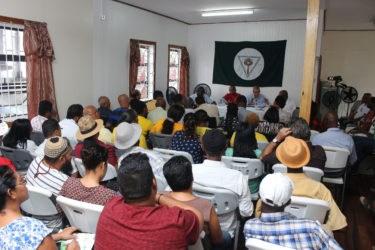Unless President David Granger agrees to a meeting within a fortnight, miners yesterday warned that the country will be treated to a slowdown in declarations and mass protest over issues of contention, including new tax measures that they say will hurt their operations.
Forty-five of the 120 miners present at a meeting of the Guyana Gold and Diamond Miners Association (GGDMA) at its North Road headquarters voted to have the association document their concerns in an open letter to President Granger. This letter, which is to be published in the local media, will call on the president to make himself available for a meeting with the GGDMA within a fortnight.
Members also voted to include in the letter an ultimatum for the president, who has told the GGDMA via letter that he will meet them once his “busy schedule” permits. Referring to this as a sign of disrespect, the miners yesterday argued that it is time that the government, which has not properly engaged them since coming into office, be made to understand that they are serious.


According to the miners, a meeting held earlier this month was overrun by other entities seeking land and lacking understanding of the issues they wished to discuss. They said another meeting with Commissioner-General of the Guyana Revenue Authority (GRA) Godfrey Statia on Tuesday left them feeling that he did not understand their concerns.
“We cannot work with such stringent measures. Before you tax it, you gotta understand it,” a miner declared, while calling for the Commissioner-General and the Finance Minister Winston Jordan to visit a mining camp and see how they really function.
Several of the miners have referred to meetings with government officials as photo opportunities and discussions with no result.
GGDMA Executive Secretary Tony Shields noted that in one discussion on the expiration of government’s concession agreement with the industry, he was forced to request not new measures but those measures which obtained before 2015.
“The government has declared us, the small miners, to be the backbone of this economy. We gotta stand on our feet and stand for our rights. The government is too busy to see us and we are the main resource. Mr. Jordan carrying us around in circles. You go to the meeting is like they sleeping and we gotta wake them up,” one miner declared.
Another said that that miners must stop sitting down for discussions. “No more meetings. We gotta act,” he declared.
After intense debate, it was decided that the GGDMA would make itself available for one more meeting with President Granger. This meeting is expected to address all the issues which developed based on the government failure to consult with the industry before recently implementing new tax measures.
One other option considered by the miners was a possible legal challenge to the tax measures, however it was decided that this process would take too long and allow government to further entrench those things the miners have found objectionable.
‘Too much’
Statia on Tuesday met small and medium scale miners but failed to convince them that new taxation measures would have no negative impact on their operations.
Following the meeting, Statia promised to consult further with the GGDMA executive, and to publish a simple and concise booklet explaining how tax measures are to be implemented in the mining industry.
He also promised to make a case to the Minister of Finance for the establishment of a taxable threshold on Tributor’s tax.
For one hour, Statia was grilled by the miners, who bemoaned the fact that complex measures and penalties have been implemented without any prior consultation with the stakeholders.
“It’s too much for us,” one miner, Charlie DaSilva, told Statia, while adding that the industry was given short notice to implement measures on which they were not consulted. He pleaded for more time to become familiar with the new measures and to familiarise his workers with them.
Statia, however, noted that the measures have already been passed in the National Assembly and that his duty does not extend beyond implementation.
A large percentage of the engagement was spent how an industry driven by cash transactions and bartering will be able to produce detailed financial records.
Asked to explain what type of documentation would be accepted as expenses, since most suppliers in the interior do not provide receipts, Statia reminded the miners that the act already stipulated that the miners should keep accounts.
He, however, noted that his organisation understands the nature of mining and is therefore amendable to allowing certain cash transactions although they must not be excessive.
Asked if GRA would accept a summary of expenditure without receipts, Statia noted that 99% of returns are not submitted to GRA with receipts but with a schedule form attached to a balance sheet. “If we check that and we are able to reconcile the two, we have no need to ask for receipts.
So while it is recommendation that you keep your receipts, we might never need it and even if we were to ask, our understanding of the nature of the industry means we will enforce certain measures the same way as we would for a business in Georgetown,” he said.
Throughout the engagement, Statia sought to placate the miners with a promise of understanding. He repeatedly told the large gathering that “miners won’t be penalised unnecessarily.” He acknowledged that GRA has in the past failed to advise taxpayers on not just those responsibilities they have, but also the benefits that they could derive from the tax system, and committed to conducting workshops and also having staff travel to outlying areas so that all can be brought up to date.
The miners, however, were not impressed. One man told Statia that while he is presenting some “very smooth ideas, in the mines it’s a different thing.”
“I don’t think you understand how this mining works,” he said before the meeting turned to another contentious issue—the increase of tributor’s tax from 10% to 20%.
The miners contend that it is already difficult to collect the 10%, with workers sometimes threatening violence and often leaving the employ of those miners who tax them.
One miner asked if it would be possible for them to continue deducting 10% from the tributors but remit the 20% to GRA with the extra 10% being considered allowable expenses for the operator.
In response, Statia said it is an allowable expense, before advising miners that they should consider carefully whether they wished to classify their workers as Tributor, Employee or Contractor.
“Each have their ramifications and different obligations which will be outlined in the booklet,” he said while noting that someone making $400,000 a month as a tributor might be better off classified as an employee, since in such a case he would pay about $44,000 in tax as opposed to the $80,000 he pays as a tributor.
“Each category has their characteristics which I will inform you of, and you will make a decision,” he said.
After the engagement, GGDMA President Andron Alphonso told Stabroek News that while he could say that he better understood the new measures, he could not yet say he was comfortable with them. “I’m happy that the Commissioner could take the time to engage us and answer our questions so frankly but we are still not sure what are good bills or bad bills, and I guess we won’t be sure until we file our returns next year,” he said.





